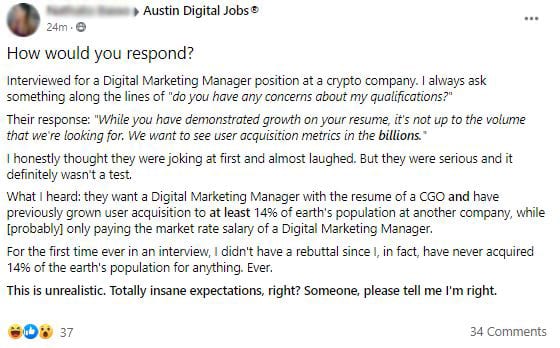How To React To Unrealistic Expectations In The Interview Process

This post is written by Scott Beardsley and Damien Richburg.
Miscommunication is the No. 1 cause of disconnects during the hiring process, and we want to address one of the most common sources of miscommunication (and aggravation).
When companies begin a job search with a list of job duties, responsibilities, and desired work experience that is not commensurate with the job title and compensation, it leads to bad outcomes and wasted time.
Recently, a job candidate wrote about their experience with this exact issue on the Austin Digital Jobs Facebook group.

The Source Of Mismatched Expectations
It’s easy to understand how a company would fall into the trap of expecting more from a candidate than they can afford (or is even fair). In many cases, companies begin writing a job description by listing their biggest needs, pain points, and pie-in-the-sky goals, and then they paint a picture of an ideal candidate.
Once that wish list is distilled into a job description, companies consider their budget and select a job title that fits the corresponding compensation level. By this point, the bloated job description may be far more than a single person is capable of doing – or more than what the job title would indicate is required for that level of role.
Some companies recognize the gap between their expectations and the listed job title and pare down the description before the job search begins. When companies do not revise the job description or reset their expectations, though, miscommunication occurs, feelings get hurt, and valuable time is wasted.
We see this way too often.
How To Respond When A Company Is Asking For Too Much
If you’re interviewing for a role and you encounter this predicament where your experience level doesn’t match what the company expects, even though your credentials make you qualified based on the job title, you have a few options.
- Don’t apply for the role if the job description seems excessive.
- If the job description seems fair, but the client communicates unrealistic expectations, pull your name out of consideration for the job.
- If you love the company and want to make it work despite the warning signs, ask pointed questions about the company’s expectations.
In the latter scenario, ask what research went into the goal(s) for the position. Has the company ever come close to achieving its stated goal(s)? Find out the source of the goal(s). Maybe the CEO has no knowledge of the goal(s), and it’s just the interviewer shooting from the hip.
The best way to respond without jeopardizing your chances of getting the job is to use data to build your case. Remove emotion and subjectivity from the conversation.
Find job descriptions for similar titles at other companies to explain how the company is asking for more than what is typical. Pull salary data from PayScale to explain what the market usually pays for the level of experience that the company desires. Point out how your experience, skills, and knowledge make you qualified for the role based on objective measures.
If none of this convinces the employer that you are a good fit for the job, then consider yourself fortunate. The company may be delusional, and you don’t want to step into a losing situation.
Knowledge Is Power For Companies
Most companies scrutinize large expenses, but they overlook the hidden cost of running an inefficient hiring process. This is why savvy and experienced recruiting firms are valuable. We can save companies time by setting and managing expectations. We also have access to market data that can help companies make smarter hiring decisions.
If you are an executive or hiring manager at a company, and the above scenario seems familiar, reach out to us for a free consultation to assess your hiring process.
Email sales@recruitAbility.ai for a free hiring assessment and salary benchmarking survey.